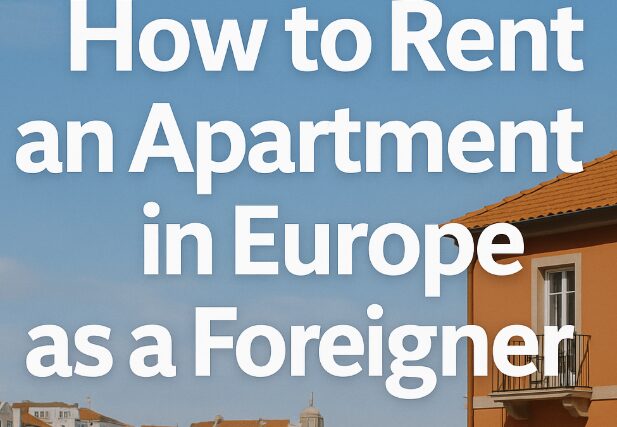Moving to Europe and renting an apartment as a foreigner can feel overwhelming at first, especially if you’re navigating unfamiliar languages, housing laws, and cultural norms. But with the right tools and guidance, finding a comfortable and affordable place to live is entirely possible.
Whether you’re relocating for work, studying abroad, or embracing the digital nomad lifestyle, this post will walk you through every step of the apartment rental process across Europe.

Start with Your Purpose and Duration
Before looking for a place, define your purpose and how long you plan to stay. Are you studying in Germany for a semester? Working remotely from Portugal for six months? Each scenario comes with different requirements, from visa type to lease duration.
Short-term stay (under 3 months): Focus on furnished rentals or serviced apartments.
Mid-term stay (3–12 months): Look into platforms that cater to digital nomads and students.
Long-term stay (1 year+): Traditional leases often require more paperwork, proof of income, and sometimes a local bank account.
Platforms like HousingAnywhere specialize in mid- to long-term stays and allow you to book remotely before you arrive.
Understand the Local Rental Market
Rental markets vary drastically from city to city. For example:
In Paris or Amsterdam, competition is fierce, and you may need to act fast.
In Lisbon or Valencia, expat-friendly neighborhoods are more accessible.
In Berlin, rent control laws can influence price and availability.
Research average prices, safe neighborhoods, and the standard lease conditions in your target city. Facebook groups and subreddits can be surprisingly useful for localized insights.
Prepare Your Documents in Advance
Landlords across Europe typically request the following:
Passport or residence permit
Proof of income or employment contract
Bank statements (sometimes local bank accounts are preferred)
References from previous landlords
Proof of enrollment (for students)
Having these documents ready in PDF format will make the process smoother, especially when responding to listings online.
Beware of Scams and Common Pitfalls
Unfortunately, rental scams exist in most European cities, especially on free listing sites. Common red flags include:
Landlords asking for full payment before you’ve seen the place or signed a lease
Deals that seem too good to be true
Requests to wire money via Western Union or similar services
Stick to verified platforms or request virtual tours before making any payments. Reputable services like NomadX and HousingAnywhere offer some protection and vet listings.
Choose the Right Platform Based on Your Needs
Here are some popular platforms that cater to foreigners:
HousingAnywhere: Ideal for students and remote workers
Spotahome: Offers video tours and remote booking
Uniplaces: Focused on student housing across Europe
NomadX: Curated for digital nomads with vetted apartments
Flatio: Mid-term stays with all-inclusive pricing
These platforms often come with customer service in English and built-in legal templates that meet local requirements.
Consider Local Culture and Tenant Rights
Tenant laws in Europe often favor the renter, but local rules vary:
Germany and Austria have strict protections against unfair evictions
France often has long-term lease obligations
Spain allows more flexibility, but informal sublets are common
Also, each country has its own norms around deposit size (often 1–3 months’ rent), pet policies, and furnished vs. unfurnished listings.
Understanding these cultural differences can help you avoid miscommunication and choose a rental that truly fits your lifestyle.
Learn Basic Local Terms for Easier Searching
Even if you’re using English-language platforms, many listings or landlord conversations will use native terms. Knowing a few local phrases can go a long way:
“Kaltmiete” and “Warmmiete” in Germany (cold vs. total rent)
“Fianza” in Spain (security deposit)
“Charges comprises” in France (utilities included)
This will help you understand what you’re actually paying for and avoid surprises in the monthly bill.
Navigating Utilities and Internet Setup
In many cases, especially with furnished or short-term rentals, utilities like electricity, gas, and internet are included in the rent. However, if you’re signing a longer-term lease, you may need to register and set them up yourself.
Ask the landlord or property manager what’s included and request any account numbers or provider information you’ll need to get started. Some useful providers include:
Orange, Vodafone, or SFR for France
MEO or NOS in Portugal
Telekom or O2 in Germany
Finding Your Ideal Home Away from Home
The key to renting successfully as a foreigner in Europe is preparation. With a clear understanding of your goals, the right documents in hand, and a cautious but proactive approach, you can find a place that feels like home.
Booking platforms like HousingAnywhere and NomadX allow you to browse listings, secure leases, and even message landlords before landing in your new city.
Don’t rush into a rental just because it’s available. Take your time, compare options, and use trusted channels to secure a space that supports your lifestyle as a remote worker, student, or expat in Europe.
